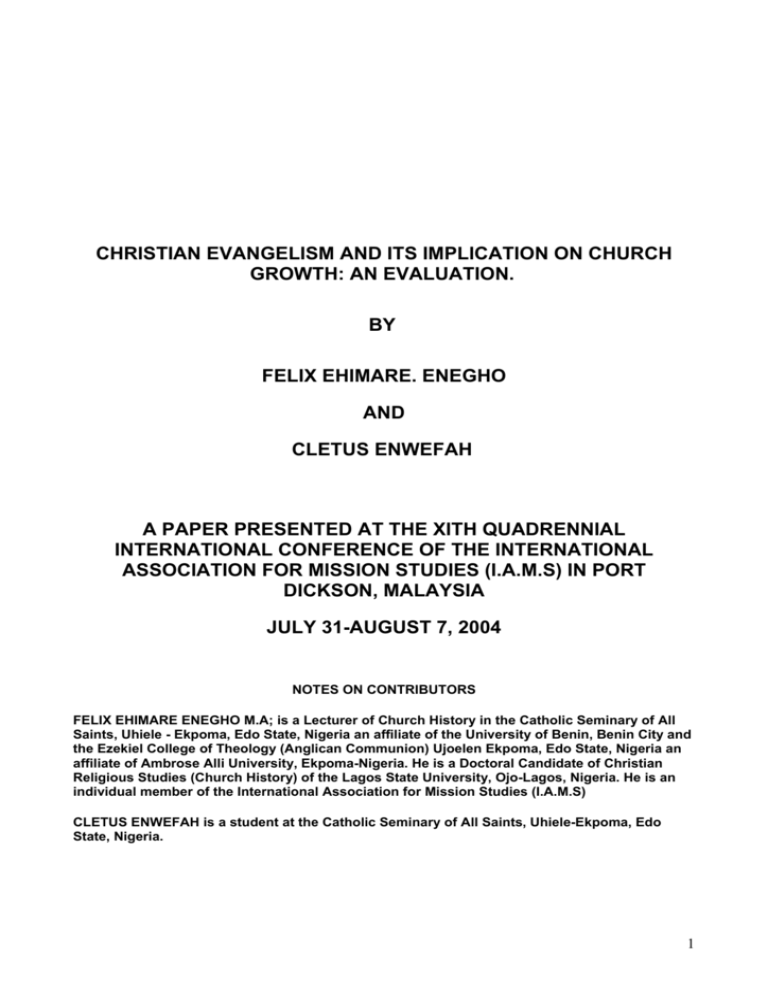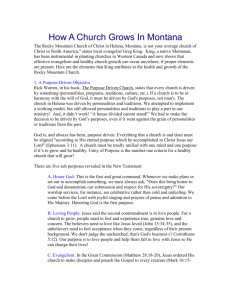christian evangelism and its implication on church growth
advertisement

CHRISTIAN EVANGELISM AND ITS IMPLICATION ON CHURCH GROWTH: AN EVALUATION. BY FELIX EHIMARE. ENEGHO AND CLETUS ENWEFAH A PAPER PRESENTED AT THE XITH QUADRENNIAL INTERNATIONAL CONFERENCE OF THE INTERNATIONAL ASSOCIATION FOR MISSION STUDIES (I.A.M.S) IN PORT DICKSON, MALAYSIA JULY 31-AUGUST 7, 2004 NOTES ON CONTRIBUTORS FELIX EHIMARE ENEGHO M.A; is a Lecturer of Church History in the Catholic Seminary of All Saints, Uhiele - Ekpoma, Edo State, Nigeria an affiliate of the University of Benin, Benin City and the Ezekiel College of Theology (Anglican Communion) Ujoelen Ekpoma, Edo State, Nigeria an affiliate of Ambrose Alli University, Ekpoma-Nigeria. He is a Doctoral Candidate of Christian Religious Studies (Church History) of the Lagos State University, Ojo-Lagos, Nigeria. He is an individual member of the International Association for Mission Studies (I.A.M.S) CLETUS ENWEFAH is a student at the Catholic Seminary of All Saints, Uhiele-Ekpoma, Edo State, Nigeria. 1 INTRODUCTION The primary task of Christians in the world is to go into the world in order to preach the Goodnews to all creatures, a command which was given by Jesus Christ. (Mark 16: 15-16). In relation to evangelism in Africa and the entire world, it seems likely that many Christians have neglected their roles in the society. It seems that the attention of many Christians is now directed towards fulfilling their own will to the detriment of the Gospel. There is no denying the fact that by reading the “signs of the times” the Christian Church in Africa and the developing world develops its unique self-understanding in response to the challenges posed by Africa’s Socio-economic, political and cultural context. Whether we construe the character of this response as “message” or as “mission,” the crucial point lies in the fact that the Church’s relevance and credibility depend on how effectively it addresses the prevailing social context in Africa and the entire developing world. The Church in Africa has the option of either preaching a Gospel which responds to the structural challenges of a continent which to many is marginalized or the African Christians will find themselves sinking with the unfulfilled hopes of Africans. If the Church in Africa neglects this African context, certainly she stands the chance of risking the loss of the Church’s relevance and credibility. (Orobabor 2000: 160-168). In the midst of the present level of development in Africa and the entire world, there is the urgent need for evangelism and re-evangelisation of people with a view to bringing forth a Church that is growing at a reasonable speed. Here, we assert that apart from the non-Christians being brought to the true knowledge of God through Jesus Christ, professed Christians need to be re-focussed to their calling as evangelizers. In this work therefore, we have examined such issues as the definition of evangelism, Jesus the visible sign of the world, the works of the Apostles, the spread of the Goodnews, Evangelism and the Church, who sends?, the challenges facing evangelisation, and the implication of evangelism on Church growth. It is envisaged that this work will stimulate further research as far as the issue of evangelism and Church growth is concerned. WHAT IS EVANGELISM? There are various definitions of evangelism. It is from the Greek concept “euangelismos” meaning “a preaching of, a zealous effort to spread the gospel, as in revival meetings”. It also means “any zealous effort in propagandizing for a cause”. (Webster’s 1978:434) Evangelism also entails “proclaiming the gospel.” Although in the New Testament the word “evangelism” is not found however, “euangelion” meaning. “Gospel” and related words abound, and the idea of proclamation of the gospel and winning of converts to the Christian faith is present. It is a truism that evangelism has been fundamental to the Church’s mission in the world. However, there are various methods of evangelism. Such as: Person-to-person witnessing by early Christians, debating in synagogues, spontaneous addresses to informal assemblies, winning a tribe by converting its leader, and catechetical instruction for inquirers. These were among the early methods. Over the years, especially in the last two centuries, revivalism has become the chief means of evangelism. As the effectiveness of mass evangelism declined and secularism increased, new methods of reaching those alienated f! rom Christianity have been sought. (Maring 1979). A widely accepted definition of evangelism states that it is “the presentation of the goodnews of God in Jesus Christ, so that men (and women) are brought, through the power of the Holy Spirit, to put their trust in God, accept Jesus Christ as their saviour from the guilt and power of sin; follow and serve him as their Lord in the fellowship of the Church and in the vocations of the common life.” (Henry and Mooneyham 1967; Visser’t Hooft 1962, Green 1970; Henry 1975) Even in the Old Testament, we are confronted with the idea of evangelization. The Israelites were held captive for many years under Roman rule. Due to their long period of captivity, there was the need to 2 give them the hope that some times, some day, the Lord, God would set them free. (Magnante Antonio 1987:34). The people politicized this freedom. The long awaited Messiah in their estimation was someone who will make Israel free. (Keating 1988:57) It is imperative to note that producing converts is the work of God. Evangelism is the duty of men and women. No one should make the mistake of thinking that it is the function of evangelists to produce converts. God alone can save a person. Paul makes this salient point very clear when he said, “I planted the seed, Apollos watered it, but God made it grow. So neither he who plants nor he who waters is anything, but only God who make things grow” (I Cor. 3:6,7; Leigh 1978:91) We are not from the above assertion stating that our job of evangelism is not important if the following statement is to be taken serious. “How can they believe… without some one preaching to them?” (Rom. 10:14). Therefore, our task of evangelism is absolutely important because it is a task that we have been given by God. (Ibid: 91) Evangelism may be defined as the process of explaining the gospel to the sinner and inviting him to meet with Christ. The task of evangelism is an instructional process, which focuses mainly on the intellect rather than on the emotions. Evangelism should be seen not as mere sob stories, scare tactics, manipulation of people, or any other form of psychological pressure. Rather, evangelism focuses squarely on the intellect. In other words, it involves the clear explanation of the gospel message. (Ibid:92) We see evangelism as sharing with others whether Christians, would-be Christians and people of other faith the free gift of salvation which we have received and inviting them to embrace that salvation emanating from the love of Christ. It entails letting people know that they need to accept that message about the Risen Lord, Jesus Christ. However, as evangelists, our burden and prayer ought to be the same as that of Apostle Paul, and that is to “Pray… that God may open a door for our message, so that we may proclaim the mystery of Christ… Pray that I may proclaim it clearly” (Col.4:3,4, Ibid:92). In this work, we are not only addressing the issue of evangelism from the perspective of political freedom but also freedom from the powers of darkness in high places. Evangelism in this sense becomes the principal function of the Christian Church. (Keating :59) JESUS: THE VISIBLE SIGN OF THE WORLD. Sequel to the announcement of the Angel Gabriel to Mary, the people of Israel had suffered in the hands of Egyptians. Their exodus from Egypt was a remarkable victory for the Israelites; for indeed it marked a New beginning for them. This beginning no doubt was one of mixed feelings. Instead of the Promised Land, the people had to settle in the wilderness-a place of pain. Many scholars opine that the events in the wilderness prefigured the rigours of evangelism. At the birth of Jesus and when he commenced his public ministry at the age of thirty, Israel was set for freedom, but little did they know that Jesus Christ came to set the entire world free. His influence was quite obvious as he preached from the synagogues to the Bank of the River and even on the mountains. He established a relationship with his disciples-those who were the heralds of the Goodnews. The Kernel of his relationship w! as LOVE. He loved all. It is worth noting that the freedom, which Exodus brings about, is no doubt a foreshadowing of future fulfillment in the New Testament, which has its fullness in Jesus Christ. The sojourn of the Israelites in the wilderness which was marked with complaints and hopelessness re-emerged in the New Testament where Jesus Christ having fasted forty days and forty nights was tempted by the devil (Ex. 24:18; Mt. 4:1-11) This in its entirety reflects the true face of evangelism,- victory over sin, victory over oppression and victory over temptation. THE WORKS OF THE APOSTLES 3 Having established a relationship with his disciples, Jesus gave them the mandate to go into the world to proclaim the Goodnews (Mk.16:15-16). From that moment onwards, they were to become the bearers of the Goodnews (Evangelizers). They became subsumed in the whole process of evangelization. Evangelism from the time of the Apostles has not been a static movement. And since it has not been static, therefore, it requires praxis or action. The works of the Apostles did not come forth until the whole events of Christ’s passion, death and resurrection had taken place. After the resurrection of Jesus Christ, sin and death indeed were conquered. This scenario was the foundation of the works of the Apostles – The works of evangelization. Solidified by the events of Pentecost (Acts 2), Peter’s first Simon convinced a large crowd of people about the Christian faith emanating from the risen Lord Jesus Christ. The ability of all those present at the Pentecost experience to hear the diverse languages spoken by the Apostles clearly shows that the message of Christ was meant for all people. THE SPREAD OF THE GOODNEWS The Geo-Political Structure of Israel was one that was conched in so many quests for power. This brought about many wars and clashes amongst kings and princes. One of such dramatic turn out was the Rebellion of Absalom against his father David (2 Samuel 15,16 and 17). This quest was influenced by the love for power and fame and as such, people were killed and social, political and economic structures were either destroyed completely or given a new look. Jesus Christ was confronted with the kind of situation mentioned above. While the quest for power was the intent of the Israelites, that of Jesus was that Love should reign among people. Power and Love consideration since the time of Jesus Christ has been at loggerhead. Acts of the Apostles gives a vivid picture of this spread. The Apostles’ conception of the Nation receiving the Goodnews ended within the jurisdiction of Jerusalem. This was against Christ’s notion of a Goodnews that should be heard in the entire world. After the events of the Pentecost, the Church started. People of various intentions all came together. The Apostles became bold because they had received the Holy Spirit. Amidst this, they restricted their work of evangelization to the confines of Jerusalem. Their emphasis was chiefly to speak about the acts of Jesus Christ and to break bread. But the events of the Hellenists and the traditional Jews showed another face of evangelization. This led to the appointment of the seven helpers to assists the Apostles. While the Apostles devoted themselves to the preaching of the Gospel, the seven helpers took the centre stage in the distribution of resources. (Acts 6). Evangelism now portends other activities such as economic concerns and political involvement’s, culture and beliefs of people etc. The spread of the Gospel was to come about when it was quite obvious that the Church under the leader! ship of Peter had other issues to take care of. But as it appeared, other concerns of the community of believers did not put aside the place of the word of God in their activities. This desire was reflected in the life of Stephen whose death and subsequent persecution of the believers heralded the spread of the word of God outside Jerusalem. Stephen was just not satisfied with sharing food to the Hellenists widows; but he proceeded to the synagogue of the Freedmen to preach the Gospel message to his fellow Hellenists. These men argued with Stephen, but they were unable to stand up against his wisdom by which he spoke (Acts 6). Even when he was taken to the Sanhedrin, (Acts 7) he used the opportunity to preach the message of the Risen Lord, Jesus Christ. The message preached to the Sanhedrin and other Hellenists (of the synagogue of the Freedmen) infuriated them and as such he was dragged outside the city and stoned to death under the supervision of a man named Saul, one man who up held the Law of Moses with so much enthusiasm. This act was to unknowingly prepare Saul (later known as Apostle Paul) to be the great evangelizer of the Goodnews of Jesus Christ to the gentile world. Apostle Paul came to grasp the message of Christ so well that he understood the oneness it brings. EVANGELISM AND THE CHURCH. “Come follow me,” Jesus said “and I will make you fishers of men.” (Mk. 1:17). The above are piercing words in Scripture that spells out the necessity of evangelism in the Church and in our world. It is only when the word of God is proclaimed to people that church growth can come about. This is evident in 4 the episodes that ensued in the Acts of the Apostles. As the Apostles preached the word of God in the midst of opposition they turned situations of communities around including the face of politics, (Ibid:77) social structures were also affected and with time, many cultural beliefs were transformed for good. The council that met at Jerusalem in C.49 A.D (Acts 15) on the issue of circumcision is one glaring example. Evangelism in the Christian Church today is passing through a great challenge and that challenge is the call to true discipleship. (Ibid:89). From recent statistical findings, the religious sentiment all over the world is in the increase. What this connotes is a response to an invitation. It is pertinent to note here that the process of evangelism does not stand on its own. It finds its base on already built socio-political cum cultural structure, which is retained by the existing economic system. So, a system that is anchored by such activity as governance, which primarily is involved in the distribution of resources, the work of evangelism, becomes one venture that is likely to have stiff opposition. But for evangelism to have a strong base, the Church-Clergy and Laity must be fully involved by not separating it from other spheres of life of the people in our communities. There is no denying the fact that the Church is so structured in a way that its operative measures cuts across all spheres of life. Its evangelical venture is geared towards building an enabling environment. The Church is expected to be a builder and as the Christians build, they are able to take into cognizance the temperament, the culture and the psychology of the people. This was exactly what Jesus did. He was able to cut across all the areas of the people’s life. He had the laws and social functions to contend with hence he paid his tax and that of his disciples. With this kind of example, can we say that evangelism is a medium through which a kind of control measure is introduced into the society? Can one insinuate that a full involvement in the affairs of society will overshadow Christ Jesus, the Kpim1 (core) of evangelism? In this kin! d of circumstance, how has our way of worship affected the process of evangelism? When Jesus talked about the entire world getting to know about him, can one really say that with the stiff challenge of modernization, that evangelism can stand the ever-growing scientific society? There is no doubting the fact that for evangelism to make any meaning in the life of the Church, and as a way of life through professing Christ, it ought to be reflected in the way of life of all those who profess Christianity and who by implication are the evangelizers. WHO SENDS? A messenger heralds every message. While the Angel Gabriel brought the Goodnews to the Blessed Virgin Mary, Paul brought the Goodnews to the Gentile world. But the ultimate sender is God who called Abraham to leave his own father’s house, his kindred to a land that He (the Almighty God) will show him. (Cf. Gen.12). This connotes that the work of evangelism insinuates a movement. Abraham’s decision to move from his homeland was stamped with a covenant. In this context, a covenant is the relationship God has established with Israel. This is established through dialogue. The covenant is a special relationship between God and His people. The very use of the phrase “His people” is quite significant because the covenant made Israel, and by extension Christians, a people united by the virtue of being one in and with God. (Ibid:102) Invariably, the covenant, which finds its heights in evangelism, becomes a dialogue between an all-powerful, ever present, all knowing God and the men who come in contact with that power. Thus, evangelism is a project as it were of the Almighty God who desires to share His love through His son our Lord Jesus Christ-the Word made flesh. In Him, we find the perfect example of an evangelizer. So, it is God who sends people to preach Christ to the world. THE CHALLENGES FACING EVANGELISM Men and women have grown to an extent that their latest goal is to eliminate pain from our world. What this connotes is a Crossless life. Can there be evangelism without the Cross? For instance, in Nigeria many Clergy and the Lay people have gotten themselves drowned in material quest; so that it is only the satisfactory part of life that is given attention in the process of evangelism. There is so much emphasis on spiritism that some feel that evangelism is synonymous with attack of the evil one-the devil. While this forms an aspect of evangelism, it is pertinent to note here that the message of Christ gets its meaning when it is applied in its fullness. By fullness, we mean an understanding of the Birth (incarnation), Passion, Death and Resurrection of Jesus Christ. 5 The rise of modernization comes with its own tide and in recognition of this, the Roman Catholic Church for instance in the Second Vatican Council (1963-1965) made it clear when she opines that the Church should find meaning in the modern world. This is done by recognizing through the Church’s structure the meaning and essence of life. Evangelism ought to have the ability to give confidence in the midst of ambiguities, openness in the face of uncertainty and hopeful courage even in the face of death. It has the ability to elevate people to a new threshold from which they can view reality with new eyes, new hope, new resistance and new vigour. Couched in a steaming political environment, the church’s work of evangelism soon faces the dismal behaviour of politicians; some of whom are professed Christians especially in many African countries. Thus, in a bid to sustaining hope, the pulpit has n! ow become a podium of attacks and refutation of unjust rule, which is dressed in injustice. This is the situation even in the so-called democratic form of government in many African countries and in some other parts of the world. With the cross pollination of culture, many alien cultures have beset communities and they stand as obstacles to the task of evangelism. THE IMPLICATION OF EVANGELISM ON CHURCH GROWTH The Christian community in Antioch grew because there was recognition of needs. Each member of he community was concerned about the welfare of the other. It was this that people around them saw and called them Christians. Since they shared things together, it shows that there were lacks. And if there were lacks, it means there was an economic system. If there were an existing economic system, a political system would have been in place to put it in operation. This operation would not have had any standing if there were no social structures to sustain it. From this perspective, the implication of evangelism on Church growth is quite obvious. We opine that for the Church to be consistent in the work of evangelism, there is the need to put in place a formidable socio-political and economic-cultural system, which will definitely aid the process of evangelism. The implementation of the above paradigm will enable the Church to reach out to the entire world. The diversity of religious groups in various areas necessitates a call to dialogue and peaceful coexistence amongst differing religious organizations. Here, we are referring to an acceptable and permeating methodology of evangelization. The strength of evangelism no doubt has a lot to do with the growth of the Church. Just as the Church prays for the increase in Church membership, it is also fitting and necessary for the Christian church in our world to constantly pray for the Faith-the acceptance of God’s word by both the non-Christians and those who are already members of the ! Church. We must bear in mind that existing political, economic, social and cultural systems could be deterrent in the process of evangelism and as such a method of adaptation should be employed. AN EVALUATION There is no doubting the fact that the Christian Church ought to be dynamic and must exist as a vibrant reality. We must note that the growth of the Church in any part of the world is not to be equated only with the size of its membership; but must above all, respond to the authentic Christian calling by rising up to Christian responsibility of giving hope to people who are in despair. We would like to give examples of two Christian churches in Africa that preached the message of Christ in unusual ways and under difficult situations. In the days of military dictatorship in Nigeria under the late despot; General Sanni Abacha (1993-1998) a large number of Christians gathered on the anniversary of the country’s annulled Presidential elections of 1993, for a candle light service, which was organised by a Church in mid-western Nigeria. Several speakers who were present protested the annulment, and the Christians offered prayers for the dismantling of the then unjust and oppressive structures of the state and military governance. During the candle light procession, government security operatives mingled with the Faithful, monitoring the situation and taking notes of possible troublemakers. The Church service ended without any violent incident, but the Christians made a point. In a practical way, the local Church was able to witness to its faith in justice and democracy, thereby demonstrating its disdain for injustice and the ! abuse for Fundamental Human Rights. Undeterred by threats of persecution, the Christians mentioned above were able to walk in solidarity with their fellow Nigerians and such efforts have led to democratic government being enjoyed in Nigeria at the moment. (Orobator :160-167) 6 Another example comes from Kamwokya, which is a small urban centre tucked away at the bottom of Kololo Hill in north-eastern Kampala, Uganda where members of a small Christian community usually congregate under a tree in order to pray, read the Bible, and discuss social ills facing the people. Their discussion focussed on the issue of the A.I.D.S/HIV epidemic. This Christian group in association with other small Christian communities of the local church was able to devise a community-based response to the A.I.D.S/HIV problem, drawing upon the resources of their culture, uncluttered by considerations of ethnic, religious or political affiliation. (Williams and Tamale 1996) They work with hospitals and health personnel, government and non-government agencies in offering organised care for people living with A.I.D.S in the following areas: home visits, material support, adoption of orphans, di! ffusion of tension, emotional and spiritual support etc. These Christians labour in service of life. (Ibid:167-168). It is worthy of note at this juncture that the means of authentic evangelism are numerous. First and foremost, we must note that as Christians we are called to witness to Christ. Second, in our preaching, we are admonished to make use of up-to-date methods; such as: the mass media, the Internet etc. There is also catechetical instruction, which entails personal contact. (Sarpong 1990:1) We also have the administration of the sacraments as deemed fit by the various Christian denominations. Therefore, there is no definite method of evangelism. Methods to be utilized are based on the person (s) to be evangelised, the situation, as well as the level of understanding of the persons or communities to be evangelised. Above all, for Christians to truly fulfil their task of evangelising the world, which will invariably lead to Church growth – physical and spiritual, the role of prayer and praxis are inevitable. CONCLUSION The Christian Church should focus on the question of methodology, as it seems to be the password to success in evangelism. When the door is opened, then the Church of Christ can indeed grow. The Church will expand if Christians are able to provide basic amenities for the society through caring for the physical needs of members and non-members, so as to be able to gain access to their spiritual need. The Church should not remain in the realm of social analysis, but should be involved in social action-not through violence but through involvement. The advent of schools, hospitals and vocation centres has been adjudged as the key factors responsible for the growth of the Church in earlier times. This was exactly what Mother Theresa of Calcutta did. As she and her sisters of Charity showed love, people saw the face of Jesus Christ more clearly. Evangelism should have a human face. Paul Ricoeur c! alls for a creative interpretation of symbols such as the Bible as well as the sacraments. They under line the need for personal involvement and affirm the fact that the process should be a continuous one. Paul Ricoeur’s analysis shows a movement to understanding; meaning, a systematic reflection, reflective thought, imaginative lure, which invites to consent. Consent completes the process of internalization, which is the mark of evangelization. Without consent on the part of those to be evangelised, that reality remains eternal to the faith-life of such persons. Paul Ricoeur challenges Christians to see evangelism and our life as a process, which like love, leads to new inventiveness. This inventiveness is growth. When we avail ourselves to these processes we can then say yes to the person of Christ who is the centre of evangelism. To say yes to Jesus Christ is to say yes to the universe-a unity, the nation that symbolically we belong to as the new Israel. Evangelism is not about presenting Jesus Christ the way we deem fit but should be the act of presenting Him as He really is and as He still is – one who is compassionate and kind. “The spirit of the Lord is upon me, because he has anointed me to preach the goodnews to the poor. He has sent me to proclaim release to the captives and recovering of sight to the blind, to set at liberty, those who are oppressed.” (Lk. 4:18 R.S.V). This was the ministry of Christ in our world and still remains so. This is what evangelism should entail and as we have succinctly enumerated, it can bring about Church growth. Evangelism, which leads to only worship, changes us and not God. But when evangelism promotes social justice, its effect will no doubt be enormous. Finally, for Christian evangelism to succeed in our world, there is the need for a new zeal, which should entail a redoubling of our commitment as Christians. Like Jesus Christ, the zeal for the Father’s House must consume us. (Jn. 2:17). And the Holy Spirit is our source of new zeal. (Iroegbu 1996:233). 7 NOTES 1. Kpim is an onomatopoeic, i.e, sound word. When the sound Kpim is heard, the core of the reality in question has been reached. Kpim is the central core or significance of something. It means the essence, central meaning and quintessence of reality. Kpim means the kernel, quiddity, origin and end of something. When we hit at the core of he piece of wood we hear the sound Kpim. That is the centre and central position. Cf. Pantaleon Osondu Iroegbu,2004 Kpim of Predicaments cause of Evil and Suffering: God, Demon, or Man? Ibadan: Hope Publications. 19 References Cited Anthony Magnante, I.M.C 1987 The Message of Exodus.Nairobi: St. Paul Publication Africa.34 Green, M 1970 Evagelism in the Early Church . Henry, C.F.H and Mooneyham, ed. 1967 One race, One Gospel, One Task Orobator, A.E 2000 The Church as Family: African Ecclesiology in its Social context. Nairobi:Paulines Publications Africa.160 – 168 Sarpong, P.K 1990 “Evangelization and Inculturation”. West African Journal of Ecclesial Studies (WAJES) 2.1:1 Webster’s New World Dictionary of the American Language 1978 “Evangelism”. 483 Williams, G. and Tamale N The Caring Community: Coping with A.I.D. S in Urban Uganda. London: ACTION AID and CAFOD; Nairobi: AMREF 1996. Visser’t Hooft, W. A. ed 1962 Report of New Delhi Assembly 8








